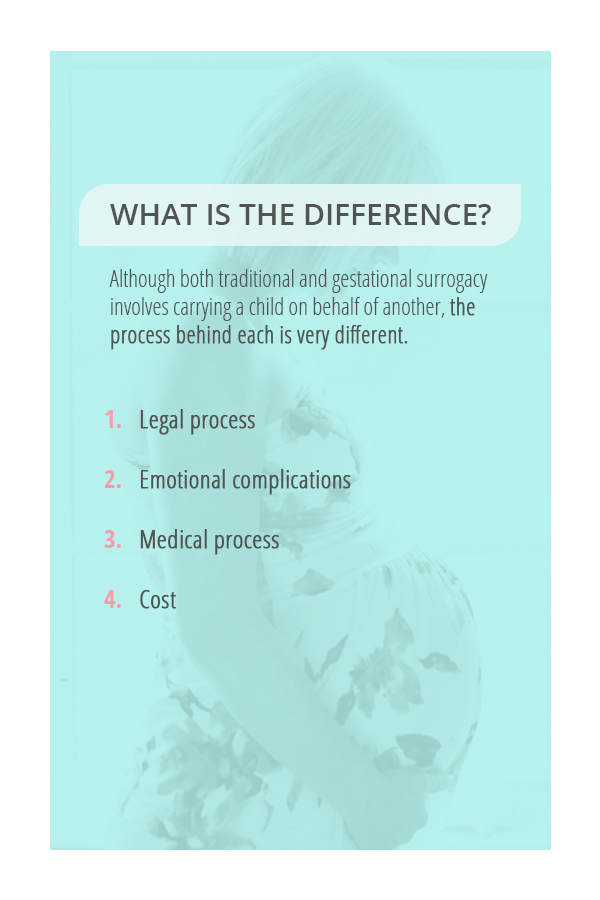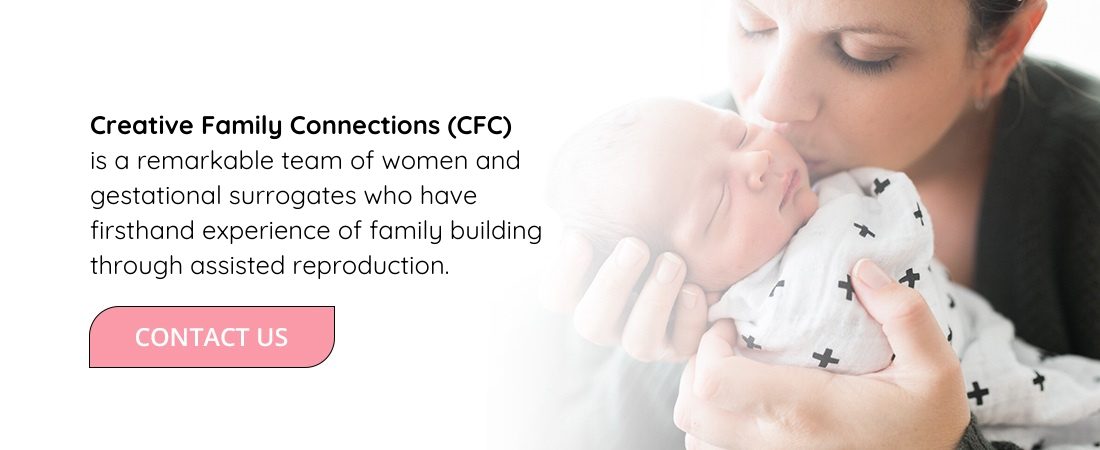Between 1999 and 2013, 18,400 infants were born via surrogacy. In recent years, surrogacy has received a lot of attention, thanks in part to a number of celebrities who have chosen to add to their families this way. But the surrogacy process isn’t just for the rich and famous. Surrogacy has become a viable option for couples experiencing infertility issues, gay couples, and singles who are ready to fulfill their dream of becoming parents.
While the popularity of surrogacy is growing, its advances have also created a lot of confusion over what these options are and the terms that describe them.
One of the most commonly misunderstood details of surrogacy is the difference between “traditional surrogacy” and “gestational surrogacy.” Whether you’re exploring the possibility of using surrogacy to grow your family or you’re looking at becoming a surrogate, you will want to know what these terms mean and how they will impact your surrogacy journey.
What is traditional surrogacy?
Also referred to as “full” or “genetic” surrogacy, in the traditional surrogacy process, the surrogate is also the egg donor. How does traditional surrogacy work? Using intrauterine insemination (IUI), the surrogate’s egg is fertilized with sperm that comes from either the intended father or a donor. She then carries the baby for the duration of the pregnancy and then signs away her parental rights when the baby is born.
Although many traditional surrogacy situations have been completed without complication, most states lack legal protections for intended parents in instances where a surrogate may refuse to give up the child after delivery. Certain state laws require that the surrogate surrender parental rights after the baby is born, but, in some cases, surrogates with a biological connection to the baby change their minds and challenge the intended parents’ legal rights to the child.
Because of that lack of legal protection and the potential for complications, most surrogacy agencies only work with gestational surrogates.
What is gestational surrogacy?
If you’re considering surrogacy, you’ll most likely experience the process of gestational surrogacy. How does gestational surrogacy work? In this much more common process, the surrogate has no biological connection to the child she is carrying. The embryo she carries is created via in vitro fertilization (IVF) and then implanted into her uterus. Depending on the circumstances, the embryo may be created using biological material from one or both of the intended parents or it may be created using donor material. Once the gestational surrogate becomes pregnant, she is released to the care of her chosen OBGYN and returns home until it’s time to give birth.
What is the difference?
Although both traditional and gestational surrogacy involves carrying a child on behalf of another, the process behind each is very different.
1. Legal process
In a traditional surrogacy situation, the surrogate is also the biological mother to the child being carried. The laws regarding surrogacy vary from state-to-state, but in some states, this means additional legal steps must be taken to terminate the surrogate’s parental rights after the baby is born, as well as establish the intended parents as adoptive parents. Unfortunately, this delay leaves time for the surrogate to change her mind after the baby is born. There have been cases where a surrogate becomes too attached to the child and refuses to sign over parental rights. The result of these cases has been a long and costly legal battle over who has a right to the child.
As part of the gestational surrogacy process, most intended parents obtain a pre-birth order while the surrogate is pregnant. A pre-birth order legally establishes the intended parents’ legal rights to the child from the moment it is born and ensures their names will be placed on the baby’s birth certificate. This is an important step because the legal rights of the intended parents are established before the baby is born, and the surrogate cannot change her mind later.
2. Emotional complications
A surrogate will feel an attachment to the baby she carries. That’s completely natural, and when you work with a reputable agency, they provide counseling and support for surrogates every step of the way. However, a traditional surrogate may feel a stronger attachment because she is biologically connected to the child. This emotional bond may make it difficult for her to hand the baby over to its intended parents after birth, creating a difficult situation for everyone involved.
In the case of a gestational surrogate, there is no biological attachment to the baby she carries. Besides simplifying the legal aspects of surrogacy, many women become gestational surrogates because they want to give the gift of a child to someone else. They will still form some attachment to the child they have carried — this is normal — but their joy over helping another family far outweighs the other emotions. This is one of the biggest benefits of gestational surrogacy.
3. Medical process
A traditional surrogate typically becomes pregnant via IUI, which means she is impregnated with the sperm of the intended father or a sperm donor and then the embryo becomes fertilized inside of her. A gestational surrogate becomes pregnant via IVF. An embryo is fertilized in a lab and then implanted into her uterus.
4. Cost
One of the reasons traditional surrogacy may be appealing to potential parents is because it does tend to be less expensive. This is because a traditional surrogate doesn’t go through IVF and require expensive rounds of fertility medications and egg retrieval.
However, it’s important to keep in mind that lower medical costs don’t always mean a lower overall cost. Although the medical costs are lower, traditional surrogacy costs are often in line with gestational surrogacy because it comes with the potential for higher legal costs if there are any difficulties surrendering parental rights to the intended parents.
Surrogate vs. “Surrogate Mother”
As you research surrogacy, you’ll likely see the terms “surrogate,” “surrogate mother,” “gestational carrier” and “gestational surrogate” used interchangeably. But do they really mean the same thing? The term “surrogate mother” is an out-dated term that was used when the traditional surrogacy process was more common because it can refer to someone with a biological connection to the child. Because most agencies no longer work with traditional surrogacy situations, the woman who carries a baby for the intended parents is referred to as a “gestational surrogate” because she has no biological relationship with the baby.
Although these terms are very formal, and you’ll see them used in official paperwork, especially legal documents, the goal is that gestational surrogates and intended parents will learn to refer to each other by more personal names. Each surrogacy journey is different, but many of our intended parents and gestational surrogates develop a bond over their shared pregnancy journey, exchanging emails and text messages with sonogram photos, updates on the baby’s health, and other relevant information.
FAQs
If you’re considering the gestational surrogacy process — either as intended parents or a surrogate — you likely have a lot of questions. You aren’t alone! Every day we receive questions from others just like you who are about to embark on this exciting journey toward completing their family.
1. Does a surrogate mother share DNA with the baby?
In the past, there were some instances where a surrogate mother was also the biological mother of the baby. Her egg was fertilized with sperm from the intended father or a donor, depending on the situation. Because of the legal and emotional ramifications of this scenario, most agencies no longer facilitate traditional surrogacy situations. Instead, a gestational surrogate becomes pregnant via IVF with an embryo created using eggs and sperm from a combination of the intended parents and donors where necessary.
2. Can babies look like their surrogate?
The gestational surrogate has no biological connections to the baby, which means there is no reason a child will be born with her features. Any resemblance is strictly coincidental.
3. What should I expect from my surrogacy journey?
Surrogacy is a noble, but challenging journey for everyone involved. Whether you opt for gestational or traditional surrogacy, it’s important to understand that this process will, at times, be stressful. Becoming a parent — or giving that gift to someone else — isn’t easy. Add in the stress of finances, hormones, and a new family member, and this process can seem emotionally overwhelming. Whether you’re an intended parent or a potential gestational surrogate, one of the most important decisions you can make is to work with an experienced, compassionate surrogacy agency that can walk with you every step of the way.
If you’re a potential surrogate, prior to any medical procedures, you’ll be required to undergo a psychological evaluation to make sure you understand the implications of what you’re doing and that you have the support system in place to cope with the after-effects of a surrogate pregnancy and delivery.
Intended parents will also undergo an extensive screening process and work closely with their agency to help manage expectations and stress throughout the process. Working with a reputable agency is an important step toward simplifying the process. They work with intended parents every single day, which means they are experienced at navigating every step of the process. Relying on them to take care of things and guide you through the process is the most important step you can take toward managing stress.
4. How long does the process take?
The surrogacy timeline varies, depending on each family’s situation and needs. The average wait time for a match between a gestational surrogate and intended parents is 6 to 9 months. Once a match is official, medical treatments leading up to IVF can begin. Once IVF is complete and conception occurs, it will be nine more months before the baby is born.
During this time, gestational surrogates can focus on maintaining a healthy lifestyle — eating right and exercising. They can also share their intentions with family members and close friends. Having a support system in place before becoming pregnant is important for a safe and healthy pregnancy.
Intended parents can use this time to familiarize themselves with their state’s surrogacy laws, as well as the guidelines of the agency. They can also begin to make plans for adding a baby to the family by researching childcare options, preparing the house, etc.
As intended parents, it’s important to select an agency that will answer questions and support you from the first form you fill out until that baby is home safely in your arms. Look for an agency that takes the time to work with you and doesn’t treat you like “just another client.” A reputable agency can also help you iron out the details of a surrogacy agreement so that you know upfront what to expect from your gestational surrogate. These details can include expectations about communication, presence in the delivery room, and future contact after the baby arrives.
5. Who should consider surrogacy?
Surrogacy is a viable option for couples experiencing fertility or same-sex couples who want to have a family. Surrogacy is also an option for older women who want to have a child that is biologically related to them, but their age or other medical conditions preclude them from IVF.
6. How do I select an agency to work with?
During the surrogacy process, you’ll have a lot of decisions to make. But the first — and perhaps most important — decision is selecting the right agency to walk you through the process. Many people mistakenly believe that they have to work with the agency that’s closest to them geographically. Or, they look at their list of fees and select the one that appears to be the cheapest.
While location and cost are certainly factors to consider, especially if you live near a reputable agency, the most important criteria for selecting an agency is to find one that is experienced, has a good reputation, and is committed to walking with you every step of the way.
A good surrogacy agency will help you through the legal details from start to finish, regardless of the state you live in. They’ll go between intended parents and the gestational surrogate to negotiate terms of communication, expectations during pregnancy, and post-partum. They can help arrange medical care and screen carriers and intended parents prior to matching them together. They negotiate and keep track of all the legal paperwork that needs to be completed. And they’ll be available to answer questions and offer reassurance every step of the way.
Creative Family Connections
Creative Family Connections (CFC) is a full-service gestational surrogate matching agency with legal services based out of the Washington, D.C. metro area. Because we’re an agency with a top law team, we can assist prospective parents through the entire surrogacy process, whether they are seeking full journey support or independent journey support. If you’re interested in becoming a gestational surrogate or are looking to complete your family via surrogacy, request more information and start your surrogacy journey today.





